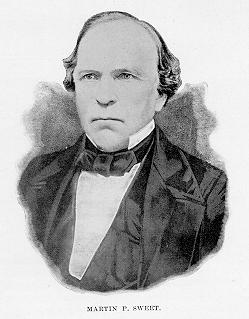Martin P. Sweet


Martin P. Sweet, who settled in Freeport in 1840, was one of the earliest members of the Freeport bar and doubtless its most eloquent orator. He had a finely modulated voice, and its tones, whether he was attempting to soothe or arouse an audience, were responsive to his feelings and thoughts. As an advocate he was at that time unsurpassed. He was especially adept in using words that would lessen or intensify the effect of their statements. he had a special faculty of toning down and getting a witness to modify his statement of damaging facts; apparently repeating the language of the witness, he would substitute less expressive words and weaken the force of the testimony. In political addresses he never failed to entertain his hearers and excite the enthusiasm of his party friends.
He was popular with the masses in northwestern Illinois and twice was nominated for member of Congress. In 1844 he expected to be elected, and probably would have obtained the coveted position but for the Mormon vote, which was solidly cast against his party. His second defeat in 1850 by a small majority must have been a sore disppointment. The exclusion of slavery from the territories - "free soil" - had become in the minds of many a subject of paramount importance for congressional action. The irrepressible conflict between freedom and slavery had arisen in the Galena district. Party ties were weakening and many voters desired before casting their ballots to have the opinions and pledges of the candidates. A series of questions were submitted to each. Mr. Sweet made candid answer, outlining his views of the proper legislation. These, like those of Lincoln at Freeport in 1858, though strongly against slavery, were not framed to suit the extreme radicals of his party. On the other hand his opponent, Thompson Campbell, an adroit politician, gave them more satisfactory answers regardless of the policy of his party. It is reported that he said he would "out-negro Sweet," which he effectually did, but he paid no attention to these pledges after election
Disheartened, Mr. Sweet withdrew from politics and closed his law office and during the next five years was an earnest and devoted minister of the gospel. In 1855 he resumed practice at Freeport, where he continued to reside until his death. At a bar meeting held on the announcement of Mr. Sweet's death, Hon. T. J. Turner, extolling his genius and eloquence as an orator, said of him: "Few men ever possessed that magnetic power which charms an audience in a greater degree. Logical in argument, terrible in invective and quick in repartee, he carried the judgments of a jury or audience, or failing here, his quick sympathies and deep pathos led them along against the convictions of judgement."
Illustrated Freeport, page 75
Journal Printing Company, Freeport, 1896.